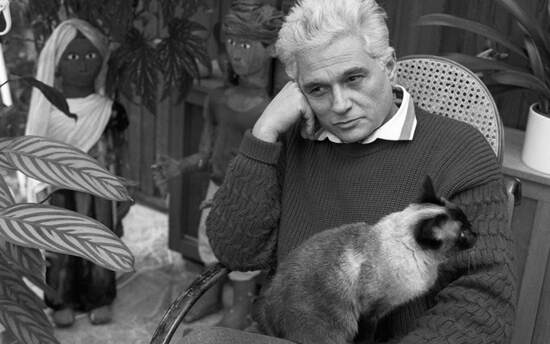|
One of the late 20th Century’s most influential thinkers was Jacques Derrida (1930-2004) whose philosophy of "deconstruction" has influenced religion, psychotherapy, feminism, law, Marxism, literary criticism, architecture, art and cultural studies. Derrida’s deconstructionist career began in the 1960s, peaked in the 1980s, and is now, it seems, in decline. Deconstruction may turn out to have been only a fad that was nurtured by bourgeois "radicals" who were looking for solutions to the problems generated by the economic and social contradictions of late capitalism but shied away from traditional Marxist analysis. What was Derrida’s deconstructionist philosophy? He began with a critique of Structuralism which was a wide spread philosophy popular in French intellectual circles in the 1950s and 60s-- displacing Existentialism as the dominant mode of thinking. Hegelians and Marxists can relate easily to the major premises of Structuralism, namely that, as Franz Hugdahl writes, the "object under consideration is the system that is comprised of the reciprocal relations among a series of facts, as, opposed to the study of particular facts in isolation." Structuralists believe that after a proper investigation of your subject matter (linguistics, anthropology or whatever) you can attain meaning and understanding by revealing the structural relationships of the concepts and ideas (and their real world counterparts) under consideration. This understanding is expressed in words with definite meanings put forth in speaking or writing. This was challenged by Derrida who maintained that references associated with words are so numerous and even contradictory that any explanation, view or text can be "deconstructed" to show that whatever you might have thought the text was saying, you could find that it said something else as well and therefore there was no privileged interpretation, no canonical reading, to which you will be forced to adhere. This way of thinking never caught on in philosophy, but was the rage, for a while, in English (and French) departments and in literary and cultural studies. The beginning of the end for "deconstruction" came in 1987. That year marked the fourth anniversary of the death of Derrida’s most important American proponent, Paul de Man, who had been a professor at Yale. De Man could take any text and argue (usually fallaciously by logic chopping, using puns and word play, taking words and phrases out of context, etc.)that it had more than one, and perhaps several, different (and even contradictory) interpretations none of which could be claimed to be the "correct" one. De Man, four years after his death in 1983 was exposed in the New York Times as having been a Nazi sympathizer in his native Belgium during World War II. He wrote anti-semitic articles for a Nazi paper supporting the Nazi cause and proposed deportation as a "solution to the Jewish problem." For Derrida and other deconstructionists this was a major embarrassment as they thought their new movement, poststructuralism, was radically progressive-- empowering marginalized elements of society by allowing them to read their own stories into the texts and traditions of Western civilization. As Jim Powell points out, "those given to deconstruction had always thought of themselves and their approach as revolutionary, iconoclastic and anti-totalitarian." Derrida rose to the defense of de Man by publishing an article "deconstructing" the anti-semitic and pro-Nazi texts of De Man’s newspaper articles. Derrida claimed that while on the surface these texts looked Nazi, nevertheless, he could detect in them subtle anti-Nazi traces and meanings. This basically dishonest application of deconstruction (in an attempt to rehabilitate de Man not the Nazis) revealed that it was a useless method with which to try and discover "meaning" as it was only the subjective desires of its practitioners that were being projected onto the text and nothing revelatory was necessarily produced at all. So what is left of "poststructuralism"? Not much I think. But neither should the foolishness of some of Derrida’s late productions ("Like the Sound of the Sea Deep within a Shell: Paul de Man’s War") obscure the importance of his early work. His 1967 "Of Grammatology'' remains a classic critique, for better or worse, of Structuralism, and, as Christopher Johnson points out, its lesson "is that one cannot simply step outside of a philosophical tradition and reason independently of it." Hegel’s view that a philosophical position must succumb to internal criticism was also developed by Marx in Das Kapital where capital’s failures are explained by the discovery of internal contradictions within its own premises not by attacking it from the outside. Derrida’s day has, nevertheless, passed. In closing I would be remiss not to point out that Derrida had progressive tendencies as a person and that he was a supporter of the anti-Apartheid movement and of the rights of North Africans living in France. AuthorThomas Riggins is a retired philosophy teacher (NYU, The New School of Social Research, among others) who received a PhD from the CUNY Graduate Center (1983). He has been active in the civil rights and peace movements since the 1960s when he was chairman of the Young People's Socialist League at Florida State University and also worked for CORE in voter registration in north Florida (Leon County). He has written for many online publications such as People's World and Political Affairs where he was an associate editor. He also served on the board of the Bertrand Russell Society and was president of the Corliss Lamont chapter in New York City of the American Humanist Association. Archives August 2021
0 Comments
Leave a Reply. |
Details
Archives
July 2024
Categories
All
|

 RSS Feed
RSS Feed